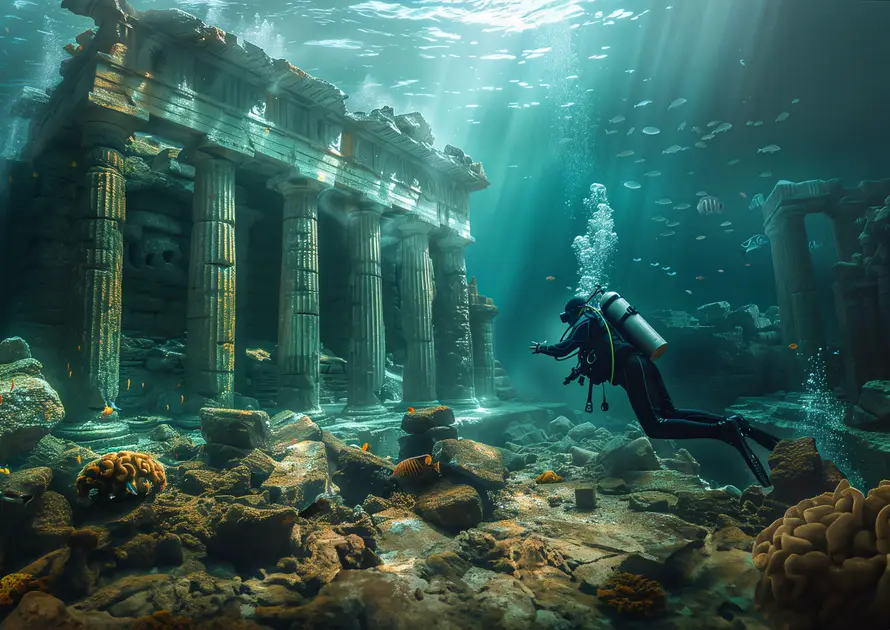
The legend of Atlantis, a mythical island civilization, has fascinated historians, archaeologists, and storytellers for centuries. First mentioned by the ancient Greek philosopher Plato in his dialogues Timaeus and Critias, Atlantis was described as a powerful and advanced civilization that existed thousands of years before Plato’s time, but mysteriously disappeared into the ocean. While many consider Atlantis a mere legend, some believe that there may be more to this story, suggesting that the lost civilization could have been real, or at least based on real historical events.
Plato’s Account of Atlantis
According to Plato, Atlantis was a vast island located “beyond the pillars of Hercules,” what we now call the Strait of Gibraltar. It was said to be a thriving and technologically advanced society, possessing magnificent architecture, a sophisticated economy, and a powerful military. Atlantis was ruled by kings, descended from the god Poseidon, and its people were known for their grandeur and wealth.
However, Atlantis’ downfall came after it fell out of favor with the gods. Plato described how the Atlanteans became corrupt, leading to their punishment. In a single catastrophic event, the island was submerged into the ocean, vanishing without a trace. Plato’s account is often seen as a philosophical allegory, warning against the dangers of hubris and moral decline.
Atlantis in Mythology and Popular Culture
Over the centuries, the story of Atlantis has been expanded upon, with numerous theories regarding its existence and location. The legend has appeared in works of literature, movies, and even in modern conspiracy theories. From ancient texts to modern pop culture, Atlantis continues to captivate our imagination.
One of the most enduring aspects of the Atlantis myth is the idea of a highly advanced civilization that mysteriously disappeared. In modern interpretations, Atlantis is often portrayed as a technologically superior society, sometimes even predating the known civilizations of Egypt and Mesopotamia. Popular books, movies, and television series, such as the 2001 Disney film Atlantis: The Lost Empire, continue to bring this ancient myth to life, blending it with adventure and exploration.
Theories About the Location of Atlantis
Over the centuries, countless locations have been suggested as the possible site of Atlantis. Some of the most popular hypotheses include:
- The Mediterranean: Many scholars point to the island of Santorini, located in the Aegean Sea, as a possible inspiration for Atlantis. A massive volcanic eruption around 1600 BCE led to the collapse of the Minoan civilization, which could have influenced Plato’s account of Atlantis. Some researchers believe that the eruption and subsequent devastation could have inspired the story of a sunken city.
- The Caribbean: Another theory suggests that Atlantis was located in the Caribbean, specifically near the Bahamas. This theory was popularized by author Ignatius Donnelly in the late 19th century, who believed that the advanced culture of Atlantis spread throughout the ancient world, influencing other civilizations like the Egyptians and Mayans.
- Antarctica: A more speculative theory proposes that Atlantis was located in Antarctica, where some researchers argue that the continent’s ice cap could have covered the remnants of a long-lost civilization. This theory, however, is not widely accepted due to a lack of solid evidence.
- The Azores: Some proponents of the Atlantis legend suggest that the Azores, a group of islands in the Atlantic Ocean, could be the remnants of the fabled civilization. These islands lie roughly where Plato described Atlantis’ location, leading to speculation that they could be the remnants of the lost civilization.
Scientific Scrutiny and Skepticism
Despite the allure of Atlantis, many historians and scientists remain skeptical about the existence of a sunken civilization. Most experts believe that Plato’s account was intended as an allegorical tale rather than a historical document. There is no archaeological evidence to support the existence of a highly advanced civilization that disappeared suddenly.
However, the mystery of Atlantis remains a compelling puzzle. Some researchers point to evidence of ancient shipwrecks, sunken cities, and even underwater structures as potential clues. In recent years, advances in underwater archaeology and technology have allowed for more detailed exploration of the ocean floor, but so far, no definitive evidence of Atlantis has been found.
Conclusion
The story of Atlantis continues to captivate people around the world, blending myth, history, and speculation. While the true nature of Atlantis remains a mystery, its legacy endures, prompting ongoing research and exploration. Whether viewed as a cautionary tale or as a search for an ancient, lost civilization, the legend of Atlantis continues to inspire curiosity and wonder. Only time will tell if the lost city of Atlantis is truly a myth, or if it is a historical mystery waiting to be uncovered.
the possibility of a lost civilization that continues to captivate the imagination of people around the world.
allaboutimage.org
Wow, it’s so fascinating to think that maybe Atlantis wasn’t just a myth, but a real place that disappeared!
slotmahjongways3.com
The lost civilization of Atlantis, a captivating blend of myth and mystery, continues to inspire curiosity about its existence and potential historical roots. phamngocson.com
Atlantis is one of those mysteries that keeps you wondering—was it just a story, or is there something hidden beneath the waves? metforminpharm.com
Whether it’s just a myth or based on real events, the story of Atlantis continues to spark curiosity and debate! https://bobbykertanegara.com